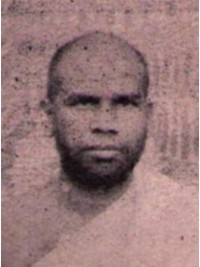66. Question:
What position does man occupy in the creation?
Answer:
Man is third in the order of these four classes of Beings i.e. 1. Narki, 2. Vegetable, mineral and animal kingdoms, (Tiryaneha) 3. Men and 4. Angels. In respect to happiness man occupies the second position to Gods or Angels; in respect to acquisition of knowledge, performance of virtuous deeds, attainment of liberation and attainment of the position of God, man occupies the first position, He holds the same position in respect to doing evil.
67. Question:
What powers has soul to become man? Has he power to become immortal or God?
Answer:
Soul has the following powers to become man.
- The softening down of delusion and passion into a mild form.
- Good thoughts.
- Manifestation of passion momentarily only.
- Indiscrimination between right and wrong.
- Propensity towards charity, without much desire for name or fame.
- Excessive love of offering charity according to one's disposition.
- Forgiveness, humility, pridelessness, compassion, purity, veracity. Desire for the reward of worship and other worldly desires.
Although we have already mentioned these powers in connection with the faculties of actions, we have nevertheless given a brief account of them here. Soul has also powers to become God. But these powers never manifest themselves until it has been purged of its eighteen defects.
The eighteen defects are these.
- Obstruction to unstinted distribution of charity.
- Obstruction to unstinted possessions,
- Obstruction to unstintedpowers.
- Obtruction to unstinted new enjoyments such as flowers, garlands &c.
- Obstruction to unstinted daily enjoyments such as woman, apparels &c.On the extinction of these five defects five powers of men come into manifestation. Just as the eye attains keen sight by the removal of eye diseases, so these powers manifest themselves in man on the disappearance of these five defects. He who has not these five powers is not fit, to become God.
- The sixth defect is laughter. Laughter is excited by seeing or hearing or remembering something extra ordinary and laughter arises from the tendency to do such acts as bind. Both these causes are not found in Arhat. The Lord is all knowing and all seeing. There is nothing outside the limit of his knowledge by seeing, hearing, remembering which he may feel surprised. Therefore there is no laughter in Him. As regards binding acts He has none of them. He is not therefore contaminated by the defect of laughter because he who laughs must not be all knowing, all seeing, and free from the influence of action.
- The seventh defect is earthly love which is not in God. He who turn love must be attracted towards charming sound, beauty, dainty dishes, fragrant smells, delicate touch, &c. He who is attracted must have desire and he who has desire must be aggrieved on its non-realization.
- The eighth defect is aversion or hatred. He who is possessed of hatred against any person or things would not be happy because of the feeling or hatred. This cannot be said of the blessed Arhat.
- The ninth defect is fear. He who has not dispelled his own fear, how can he be blessed Arhat.
- The tenth defect is disgust which arises at the sight of unclean things. As God's knowledge is universal. He must be extremely unhappy if He were possessed of the feeling of disgust. Therefore this too is not a part of the qualifications of the Lord.
- The eleventh defect is sorrow. He who has sorrow cannot be God.
- The twelfth defect is lust. He who is lustful and indulges in the sexual pleasures of women can never be called God by any sensible man.
- The thirteenth defect is falsehood which leads to darkness and this cannot be attributed to God.
- The fourteenth defect is ignorance. He who is full of ignorance can never be all-knowing God.
- The fifteenth defect is sleep. He who sleeps has a gap in knowledge. The blessed Arhat is all-knowing, so He is beyond sleep.
- The sixteenth defect is desire. He who is full of desire cannot be Arhat.
- The seventeenth and eighteenth defects are passion and anger.
- He who has passion and anger cannot be mediator. Such a man suffers from anger, pride, illusion and delusion. On the other hand the Lord is passionless, equally disposed towards friends and foe, having an equal measure of consideration for all beings. He makes none either happy or miserable. If He makes other happy or miserable, He cannot be passionless and full of compassion. For these reasons the blessed Arhat cannot have passion and hatred.
One who has any of these eighteen defects cannot be Arhat, because He is entirely free from them. Take an instance of a well-polished diamond and a raw diamond that is still in mine. Although the diamond that is embedded in the mine is not bright yet it possesses all the qualities of a genuine diamond; when it will be dressed and polished it will be considered as one of the brightest jewels. Similarly the soul has powers to become God but owing to the impurities of eight kinds of actions that have accumulated in the course of ages, these powers have not become manifest. The soul that will be brightened by the instructions of a teacher subject to five attendant causes such as time &c, its divine powers will become manifest and that man will become a God. God is not any particular man; the innumerable souls that have attained liberation in the course of immemorial ages or reached the position of Siddhas or will reach it in future have and will become God. Just as this world is eternal by reason of its unceasing continuity so the Siddhahood is also eternal. Souls have been attaining liberation from time immemorial. If you entertain a doubt that since souls have been attaining liberation from time immemorial, than a time would come when all souls have attained liberation and the worlds will be depleted of all souls. This is not right. Things which are limited in calculation will have an end but things which are unlimited in name and form will never have an end, for example, the earth and the sky. If you measure both these objects you will come to the end of the earth because it is limited but you will never come to the end of the sky because it is unlimited. Similarly the number of the souls in the world is unlimited and therefore there will be no end of the number of the souls even if they went in salvation from eternity to eternity. If you say that the number of the souls must be calculable in the unlimited knowledge of God, because it cannot be unlimited knowledge if it could not count them, the answer is that one who has unlimited knowledge views unlimited things as unlimited and the limited ones a« limited. For instance, the sky is unlimited; it is similarly regarded by God. If you do not accept this explanation then whatever view of God you advance will also have this fallacy. The believers in God hold God to be beginningless and endless. Does God see His own beginning or end or no? If He sees them, then the worth of God is proved and it is also proved that there was no God before His birth. If God sees His own end then it is also possible that He would die. If you say that God does not see His beginning and end simply because God has no beginning or end, then on your own statement you will find that the knowledge of God is limited because He cannot see His beginning or end. O, Dear, the number of the souls and the measurement of the sky are equally unlimited and therefore the Lord too does not see their end. He sees the absence of that which is not and the presence of that which is.This has been explained because it has a bearing on the subject.
 Shrimat Vijyasandsuri
Shrimat Vijyasandsuri
